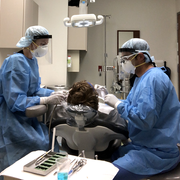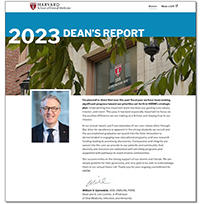
In early March 2020, Harvard University and Harvard School of Dental Medicine began closely monitoring the coronavirus (COVID-19) outbreak. As the situation changed rapidly, the top priority remained the health, safety, and well-being of students, faculty and staff, on and off campus.
The School began working on several contingency scenarios and taking decisive, informed action to limit the spread of COVID-19 while ensuring the continuity of teaching, research and patient care. These efforts involved rapidly moving to virtual learning, ramping down research labs, limiting patient care, and moving to a remote workforce.
Providing Care in a Crisis
By March 16, the Harvard Dental Center halted all clinical services except dental emergencies for existing patients. The number of faculty, staff, and students handling emergency services was cut back, with very few students assigned to the emergency rotation. This dramatically reduced the clinic caseload, which went from seeing 200 patients a day to just a nominal number for urgent care.
The scale-back was aimed at protecting students, faculty and staff from exposure, while keeping emergency dental treatment going to ease the expected strain on hospitals and the health system in the coming weeks.
“As health systems will be challenged and tested in the coming weeks (or months), lack of access to dental emergencies treatment will only make it worse for both the hospitals and patients with true dental emergencies,” said German Gallucci, Raymond J. and Elva Pomfret Nagle Associate Professor of Restorative Dentistry and Biomaterials Sciences and executive director of the Harvard Dental Center.
“The best way the dental community can help mitigate this global health crisis is by keeping a minimal service for urgent dental care. We should take care of our own emergencies without adding additional stress to the soon-to-be overloaded health system by being available for the ones who really need us,” he said.
The Harvard Dental Center also began seeing patients virtually through on-call/offsite tele-dentistry stafed by faculty and advanced graduate education students.
Jennifer Gibbs, director of the Division of Endodontics, said, “This could be our new normal for an extended period of time. Even when the spread of the coronavirus is under control, we will have to learn how to practice with this disease among us.”
Learning Curve
As all Harvard students were asked to move off-campus, instructors had to quickly redesign courses to move class online. For HSDM, this meant deferring practical sessions until students could have access to facilities where they could take radiographs and intra-oral photographs and practice oral exam techniques. Regular meetings and advising turned virtual with online sessions and small tutorials on Zoom and Facetime, and faculty took creative approaches to teaching their courses.
“I teach in the HMS course: Practice of Medicine (POM),” said Samuel Coffin, an instructor in Restorative Dentistry and Biomaterials Sciences. “We brought our patient interviewing part of the course (POM/ Interviewing and Communication Skills) online using role plays and simulated interviews since we could no longer interview real patients in the hospital.”
“While we may be doing things diferently, we are still facilitating learning and focusing on the same skills. I believe that the silver lining to this dark cloud is that it has made us innovate. Some of these new teaching skills we will continue to utilize when the clouds have cleared,” he added.
Virtual Visit
 While HSDM’s current students adjusted to taking their courses online, a new crop of recently admitted DMD students participated in a virtual “Revisit” weekend. Revisit weekend is held each spring to give newly admitted HSDM and HMS students the opportunity to return to campus and solidify their plans. Faculty, current students, and staff welcomed the incoming class with a variety of academic and social events. Incoming DMDs were matched with first-year virtual student hosts who helped to personalize their experience. “The virtual format enabled more incoming students to attend than ever before and feedback has been overwhelmingly positive,” said Sarah Troy-Petrakos, director of Admissions.
While HSDM’s current students adjusted to taking their courses online, a new crop of recently admitted DMD students participated in a virtual “Revisit” weekend. Revisit weekend is held each spring to give newly admitted HSDM and HMS students the opportunity to return to campus and solidify their plans. Faculty, current students, and staff welcomed the incoming class with a variety of academic and social events. Incoming DMDs were matched with first-year virtual student hosts who helped to personalize their experience. “The virtual format enabled more incoming students to attend than ever before and feedback has been overwhelmingly positive,” said Sarah Troy-Petrakos, director of Admissions.
“Everything was put together and organized fantastically,” said a student in the Class of 2024. “I cannot wait to be a part of the Harvard community!!”
As professional and educational methods have shifted, so have traditional social occasions that hold the community together. Students, faculty and staff miss HSDM’s tea time, a chance to connect with friends and colleagues. However, new traditions flll the void with Zoom social hours.
“Seeing everyone’s face on the Zoom screen is both reassuring and it helps maintain a sense of community. From this also comes the experience of confronting the unexpected and learning how to overcome a significant obstacle. It may not seem so now, but we may be stronger for having lived it,” said Sam Coffin.


